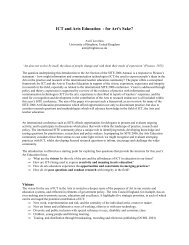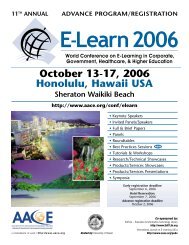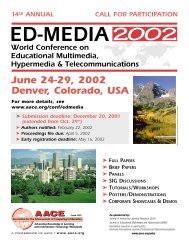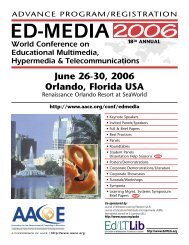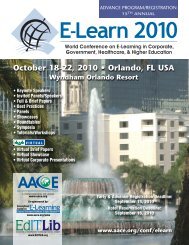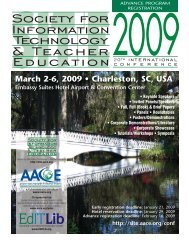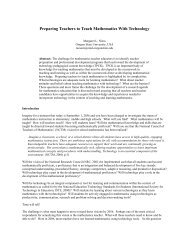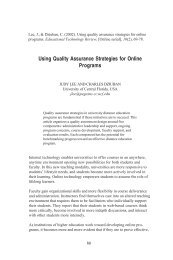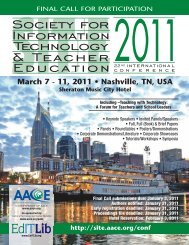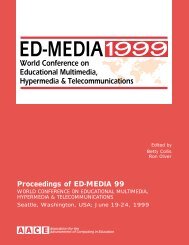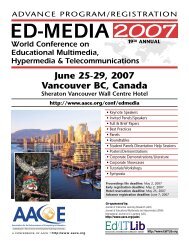ED-MEDIA 1999 Proceedings Book - Association for the ...
ED-MEDIA 1999 Proceedings Book - Association for the ...
ED-MEDIA 1999 Proceedings Book - Association for the ...
Create successful ePaper yourself
Turn your PDF publications into a flip-book with our unique Google optimized e-Paper software.
Tutee’s Reflective Thinking of Tutor’s Response Produces Monitoring<br />
Michiko Kayashima<br />
Department of Art<br />
Tamagawa University, Japan<br />
kayasima@lit.tamagawa.ac.jp<br />
Toshio Okamoto<br />
The Graduate School of In<strong>for</strong>mation Systems<br />
University of Electro-Communications, Japan<br />
okamoto@ai.is.uec.ac.jp<br />
Abstract: This study proposes two elements that were encountered during analysis of<br />
cross-age tutoring investigations. The first is that both learners’ questions and tutors’<br />
advice is representative of <strong>the</strong>ir externalized metacognitive experiences. The second is<br />
<strong>the</strong> manner in which interaction between learners and tutors develops <strong>the</strong> learner’s<br />
monitoring abilities. If learners notice differences in meaning in <strong>the</strong> responses tutors<br />
give to learners’ questioning and per<strong>for</strong>m conscious cognition of <strong>the</strong> tutor’s externalized<br />
metacognitive experiences, <strong>the</strong> learner’s reflective thinking caused by <strong>the</strong> tutor’s<br />
responses produces <strong>the</strong> learner's monitoring as affected by <strong>the</strong> tutor’s criterion.<br />
Introduction<br />
Recently <strong>the</strong> view of learning has changed from <strong>the</strong> “transference of knowledge” to<br />
“constructing knowledge through interaction with <strong>the</strong> external world including o<strong>the</strong>rs”. Traditionally<br />
teachers have been about <strong>the</strong> task of transferring <strong>the</strong>ir knowledge. The important concern <strong>for</strong> <strong>the</strong> teacher<br />
was <strong>the</strong> organization of knowledge so those learners could learn effectively. However, <strong>the</strong> new view of<br />
learning considers that learners construct knowledge by <strong>the</strong>ir own processes through evaluation and<br />
improvement of <strong>the</strong>ir own knowledge. Concurrently <strong>the</strong>y are learning how to learn as well.<br />
Under <strong>the</strong> new view of learning, many researchers focus on <strong>the</strong> role of o<strong>the</strong>rs in <strong>the</strong> external<br />
world. They have tried to practice collaborative learning. Collaborative learning is defined as learners<br />
working on a task toge<strong>the</strong>r. However it is yet unclear whe<strong>the</strong>r collaboration improves learning. There is<br />
some research supporting <strong>the</strong> view that low achievers progressively become passive while collaborating<br />
with high achievers (Mulyran 1992).<br />
A number of researchers in cognitive science have proposed reasons as to why collaborative<br />
learning is more efficient than learning alone. The aim of <strong>the</strong> early studies of collaborative learning was to<br />
determine <strong>the</strong> conditions under which collaborative learning is efficient. Experiments were conducted to<br />
answer <strong>the</strong> question: “Under what conditions is collaborative learning efficient” ra<strong>the</strong>r than “Which<br />
interactions occur under which conditions" or "What kind of effects do <strong>the</strong>se interactions cause” They<br />
have considered conditions such as <strong>the</strong> composition of <strong>the</strong> group, <strong>the</strong> features of <strong>the</strong> task, <strong>the</strong> context of<br />
collaboration and so on. However <strong>the</strong>se conditions were very complicated and inter-connected. Thus it<br />
was difficult <strong>for</strong> researchers to identify <strong>the</strong> relationship between <strong>the</strong> conditions and <strong>the</strong> effects.<br />
Consequently <strong>the</strong> study of collaborative learning has shifted in focus to <strong>the</strong> relationship between <strong>the</strong><br />
process of collaboration itself and <strong>the</strong> learning results.<br />
Our focus is on <strong>the</strong> latter. We envisage how and why interaction in <strong>the</strong> collaborative process<br />
progresses participants’ metacognitive experience on <strong>the</strong> assumption that collaboration develops<br />
participants’ metacognitive experience. This term, metacognitive experience, is based on Nelson and<br />
Narens metacognitive system model of monitoring and control.<br />
Nelson and Narens proposed a metacognitive system model in which <strong>the</strong>y split <strong>the</strong> cognitive<br />
process into two or more specifically interrelated levels. The most simple metacognitive system model<br />
consists of two interrelated levels; <strong>the</strong> meta-level and <strong>the</strong> object-level. Fur<strong>the</strong>rmore, <strong>the</strong> metacognitive<br />
system model has a kind of dominance relationship, which is defined by <strong>the</strong> direction of <strong>the</strong> flow of<br />
in<strong>for</strong>mation; monitoring and control. Monitoring occurs when <strong>the</strong> meta-level is in<strong>for</strong>med by <strong>the</strong> objectlevel;<br />
control occurs when <strong>the</strong> meta-level modifies <strong>the</strong> object-level (Nelson & Narens 1994).



